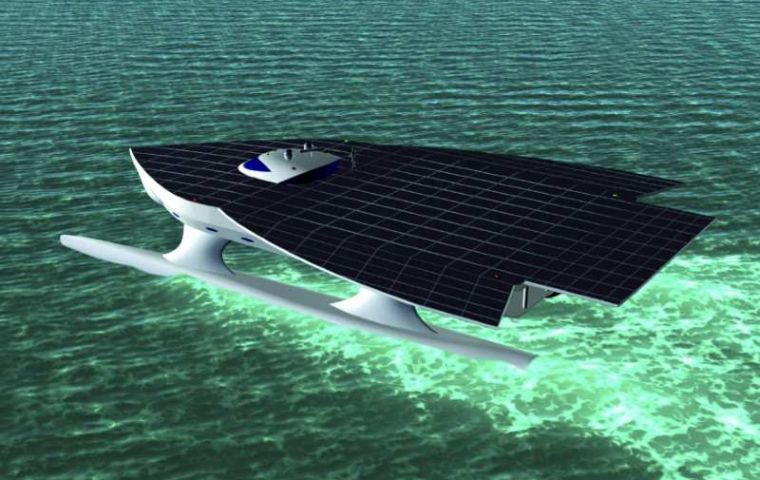MercoPress. South Atlantic News Agency
World largest solar powered trimaran prepares to circumnavigate the world
 The start of its around-the-world tour is set for April 2011 on an east-to-west equatorial route
The start of its around-the-world tour is set for April 2011 on an east-to-west equatorial route The world's largest solar-powered trimaran, PlanetSolar, will not have sails. Instead of wind it will rely on the power of the sun to circumnavigate the world in 140 days. That's according to plans sketched out by the financial backers and designers of the triple-hull, 30-metre-long, 15-metre-wide boat under construction at Knierim shipyard in Kiel, Germany.
The multi-hull vessel, commissioned by German investor Immo Stroeher, has a futuristic look, like something out of Star Trek. Lying flat across the top of the centre hull is a large array of photovoltaic solar panels.
Steffen Mueller, who owns the shipyard with Gunnar Knierim, said the cost of the boat lies in the two-digit millions. It is expected to go from dry dock into water in January ahead of a tour of European cities. The start of its around-the-world tour is set for April 2011 on an east-to-west equatorial route. It will start out by crossing the Atlantic, passing through the Panama Canal en route to the Pacific and Indian oceans.
The boat will stop in places like Paris, Hong Kong and New York to demonstrate the solar technology powering the vessel.
“We want to communicate around the world that there are solutions that exist with renewable energies,” said PlanetSolar spokesman Dany Faigaux in a news release on the Cleantech Group website.
In recent months about 30 experts have completed the carbon fibre side hulls at the Kiel shipyard, where exclusive yachts and motorboats are built for wealthy private customers. In December the two hulls will be loaded with blocks of batteries with a total of 1.3 megawatts of power.
Because the PlanetSolar doesn't entirely fit in the space available at the shipyard, the main hull is being built in a yard nearby. The San Jose, California-based company SunPower is providing the solar cells, which will be fitted onto the 508-square-metre top of the main centre hull. Only the cockpit sticks up off the flat surface.
The solar panels produce 1,000 watts of electricity per day, said Mueller. Surplus energy is stored in the batteries, enabling the 58-ton trimaran to continue its journey without sun for up to three days at a speed of 10 knots or 18 kilometres per hour, he said.
Despite the large energy reserves, skippers Raphael Domjan and Gerard d'Aboville will have to travel prudently. D'Aboville, 64, made history in 1980 as the first person to cross the Atlantic in a rowboat. Eleven years later he made the same trip across the Pacific. He and Domjan, who is almost 30 years his junior, developed the idea for the solar-powered trimaran.
The two adventurers teamed up with Stroeher, who according to reports is paying 10 million euros to construct the boat, to realize the vision. After the boat makes its world trip, it is expected to be used by Stroeher as his personal yacht. Mueller said the job of constructing the boat has been a big challenge. In the current difficult economic times the project has secured 30 jobs at the shipyard, which employs 57 people.
Every detail of the boat was tested using models, tow lines and wind tunnels. One of the features the designers chose, for example, is a slow turning propeller with a 2.5 metre diameter, the shaft of which sits just over the surface of the water. Mueller said this is very effective and it allows the boat to be more easily steered.
Other features of the trimaran are described by the shipyard owner as spartan - for now. “As we work on the project we always speak of the boat's first and second life,” said Mueller.
After it returns from its world tour in the autumn of 2011 it will be kitted out in luxury. Though it will be his personal yacht, Stroeher probably will rent the boat to people who want to experience a sun-powered boat ride.




Top Comments
Disclaimer & comment rulesCommenting for this story is now closed.
If you have a Facebook account, become a fan and comment on our Facebook Page!